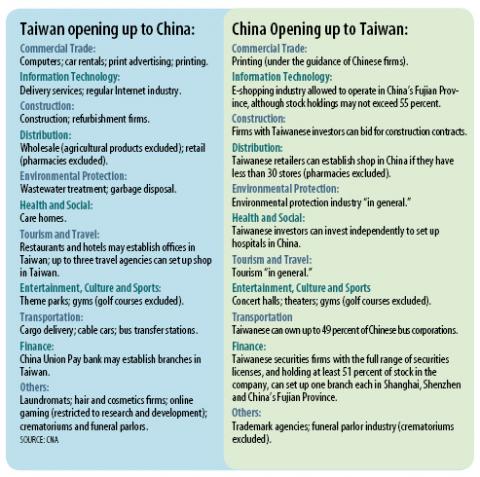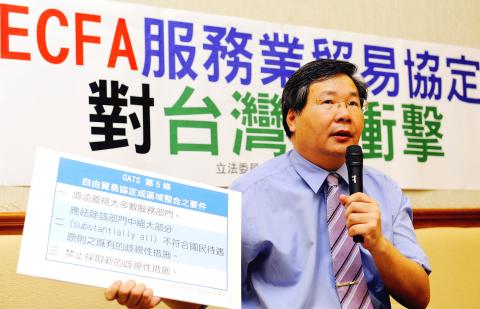The signing of a service trade agreement with China could affect issues on the legislature’s agenda during the extra session this week, after the Taiwan Solidarity Union (TSU) yesterday vowed to block all proceedings in the remaining four days.
TSU legislative caucus whip Hsu Chung-hsin (許忠信) told a press conference that the trade pact would subject local businesses to fierce competition, bring in white-collar Chinese workers, and lead to an outflow of Taiwanese expertise and knowledge to China.
The service trade agreement is one of the follow-up agreements to the Economic Cooperation Framework Agreement (ECFA) which came into effect in July 2010.

GRAPHIC: TT
Although there are more stringent restrictions on Chinese investments in certain industries covered by the service trade agreement, under WTO rules, those safeguards will have to be lifted after the end of the interim period of 10 years following the ECFA’s signing, Hsu said.
“From then on, Taiwan will be wide open to China” because limiting the number of China-funded firms, share holdings, scope of business activities and recruitment of Chinese employees would be considered a violation of the core principles of the WTO, Hsu said.
Under the agreement, China would open 80 service sectors to Taiwan, while Taiwan would open 64 sectors to China. The sectors include those related to commerce, telecommunications, construction, distribution, the environment, health, tourism, entertainment, culture, sports, transportation and finance.

Photo: George Tsorng, Taipei Times
The wide range of industries covered by the trade pact was not made public until the agreement was signed at 2pm on Friday in Shanghai.
Hsu said that financial conglomerates would benefit from the agreement because the pact would facilitate access to the Chinese banking, insurance and securities markets, but that will “come at the expense of the majority of small and medium-sized enterprises and workers in Taiwan.”
The TSU demanded that Premier Jiang Yi-huah (江宜樺) present the pact before the legislature to discuss with lawmakers how it would affect the nation, and that the deal should take effect only after the legislature approves it.
The TSU will boycott the remaining days of the extra session scheduled for next month to force the Chinese Nationalist Party (KMT) to agree to its demands, Hsu said.
During the session, the KMT had expected to pass an amendment to the Income Tax Act (所得稅法) to scrap the 8,500-point TAIEX threshold that automatically triggers the imposition of the tax on most individual investors. It also wants to pass a proposed referendum on the Fourth Nuclear Power Plant in New Taipei City’s (新北市) Gongliao District (貢寮) as well as clearing a number of other bills before the extra session ends on Thursday.
The KMT also considers the draft senior secondary education act (高級中等教育法) as urgent, considering the limited time left to prepare for the planned 12-year education scheme, set to begin in August next year.
Lawmakers across party lines on Friday called for a full and detailed examination of the signed service trade pact, with the opposition demanding that the legislature examine the deal thoroughly before deciding whether to allow it to go into effect.
KMT caucus whip Lin Hung-chih (林鴻池) yesterday said his party was not opposed to a review of the agreement by the legislature, but did not consider it necessary that Jiang present it at a question-and-answer session with lawmakers.
Lin said the KMT hoped the bills that were scheduled to be dealt with this week would not be delayed by the service trade pact issue.
Democratic Progressive Party (DPP) caucus whip Ker Chien-ming (柯建銘) asked President Ma Ying-jeou (馬英九) to step forward to address the public’s concerns.
Ker said the DPP would otherwise boycott a review of the agreement and demanded that the agreement be overruled and that Taiwan restart negotiations with China over the opening up of the service sector.

ENDEAVOR MANTA: The ship is programmed to automatically return to its designated home port and would self-destruct if seized by another party The Endeavor Manta, Taiwan’s first military-specification uncrewed surface vehicle (USV) tailor-made to operate in the Taiwan Strait in a bid to bolster the nation’s asymmetric combat capabilities made its first appearance at Kaohsiung’s Singda Harbor yesterday. Taking inspiration from Ukraine’s navy, which is using USVs to force Russia’s Black Sea fleet to take shelter within its own ports, CSBC Taiwan (台灣國際造船) established a research and development unit on USVs last year, CSBC chairman Huang Cheng-hung (黃正弘) said. With the exception of the satellite guidance system and the outboard motors — which were purchased from foreign companies that were not affiliated with Chinese-funded

PERMIT REVOKED: The influencer at a news conference said the National Immigration Agency was infringing on human rights and persecuting Chinese spouses Chinese influencer “Yaya in Taiwan” (亞亞在台灣) yesterday evening voluntarily left Taiwan, despite saying yesterday morning that she had “no intention” of leaving after her residence permit was revoked over her comments on Taiwan being “unified” with China by military force. The Ministry of the Interior yesterday had said that it could forcibly deport the influencer at midnight, but was considering taking a more flexible approach and beginning procedures this morning. The influencer, whose given name is Liu Zhenya (劉振亞), departed on a 8:45pm flight from Taipei International Airport (Songshan airport) to Fuzhou, China. Liu held a news conference at the airport at 7pm,

Authorities yesterday elaborated on the rules governing Employment Gold Cards after a US cardholder was barred from entering Taiwan for six years after working without a permit during a 2023 visit. American YouTuber LeLe Farley was barred after already being approved for an Employment Gold Card, he said in a video published on his channel on Saturday. Farley, who has more than 420,000 subscribers on his YouTube channel, was approved for his Gold Card last month, but was told at a check-in counter at the Los Angeles International Airport that he could not enter Taiwan. That was because he previously participated in two

SECURITY RISK: If there is a conflict between China and Taiwan, ‘there would likely be significant consequences to global economic and security interests,’ it said China remains the top military and cyber threat to the US and continues to make progress on capabilities to seize Taiwan, a report by US intelligence agencies said on Tuesday. The report provides an overview of the “collective insights” of top US intelligence agencies about the security threats to the US posed by foreign nations and criminal organizations. In its Annual Threat Assessment, the agencies divided threats facing the US into two broad categories, “nonstate transnational criminals and terrorists” and “major state actors,” with China, Russia, Iran and North Korea named. Of those countries, “China presents the most comprehensive and robust military threat